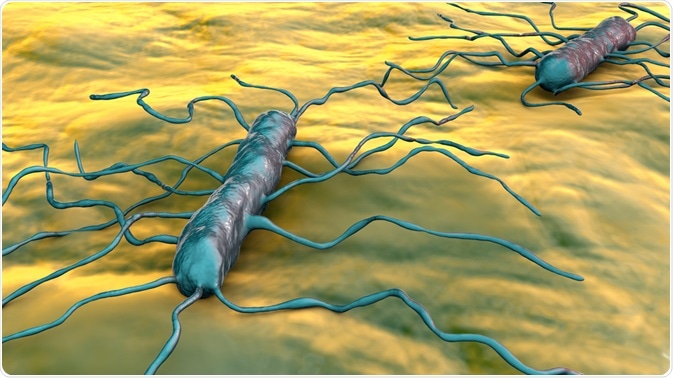Listeriosis is predominantly a food-borne disease caused by the ubiquitous gram-positive bacterium Listeria monocytogenes, which was initially recognized as a foodborne pathogen in the early 1980s.

Image Credit: Kateryna Kon / Shutterstock.com
Patient populations that are most likely to get infected by listeriosis include the elderly, neonates, pregnant women, human immunodeficiency virus (HIV) patients, as well as those with an immunodeficient status. As a high mortality rate is associated with Listeria infections, effective treatment and prevention of this condition are essential.
Antimicrobial therapy
Successful treatment of listeriosis with ampicillin or penicillin as a monotherapy has been reported in the medical literature. Nevertheless, since in vitro tolerance or even resistance to penicillin alone has been described, and there are a plethora of studies showing in vitro synergy and improved clinical efficacy, the combination therapy with ampicillin and gentamicin represents the initial regimen of choice.
The duration of therapy for bacteremia should be between one and two weeks, whereas meningitis cases may need to be treated for longer periods of time of up to three weeks. On the other hand, infective endocarditis and brain abscesses necessitate treatment for six to eight weeks. Doses should be varied according to the patients’ altered organ function, with antimicrobial serum monitoring when appropriate.
In neonates, an ampicillin dose of 150 to 200 milligrams (mg)/ kilogram (kg) per day for nonmeningeal infections or 300 to 400 mg/kg per day for Listeria meningitis is recommended. However, certain studies suggest that dosages for meningitis should be used in all cases. Furthermore, the higher dose is appropriate for treating listeriosis in immunocompromised hosts.
During pregnancy, the recommended dosage for listeriosis is 2 grams (g) of ampicillin every 6 to 8 hours, which is a dose that has been found to provide adequate intracellular penetration and crossing of the placenta. The optimal duration of therapy in pregnancy has not been established; however, 3-4 weeks of treatment is considered the minimum.
Alternative antimicrobial drugs and regimes are sometimes needed in certain patient groups that may necessitate alternative antimicrobial drugs as a result of allergies or specific diseases. Second-line agents that can be used include trimethoprim-sulfamethoxazole as the best alternative single agent, followed by erythromycin, vancomycin, imipenem, and fluoroquinolones. It must be noted that cephalosporins do not show adequate activity against Listeria monocytogenes.
Listeria Infection
Prognosis and prevention
Untreated listeriosis is fatal within 4 days, and even treatment is unable to save patients with underlying immunosuppression in up to 40% of cases. The bacteriemic and meningitic forms of listeriosis can be cured; however, serious complications can ensue despite prompt antimicrobial therapy. After the infection of the central nervous system (CNS), sequelae such as strabismus, hydrocephalus, and retardation may arise.
Therefore, the best approach is the prevention of listeriosis. General recommendations for prevention are the same as for other foodborne infections and include thorough cooking of raw food from animal sources, careful washing of raw vegetables before cooking, the avoidance of unpasteurized milk, as well as adequate hand hygiene.
Those at increased risk of acquiring listeriosis should refrain from eating soft cheeses, refrigerated pâtes, refrigerated smoked seafood, meat spreads, luncheon meats, and deli meats unless they are cooked until steaming hot. Cross-contamination of other foods, utensils, and food preparation surfaces with fluids from hot dog packages should be avoided.
Some ways in which food safety protocols have been improved to provide a greater level of protection against listeriosis include continuous monitoring, improvement of surveillance systems, as well as the development of adequate food safety policies. Doctors, and especially obstetricians, should act as food safety educators, as pregnant women will not likely change their attitude if they do not recognize or believe the source of the information.
References
Further Reading
Last Updated: Jun 17, 2023